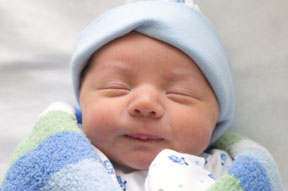Newborn Sleeping

Newborn sleeping habits (more aptly referred to as not-sleeping habits) can make the first few weeks of parenthood challenging at best for the entire family.
When your baby won't sleep for more than an hour or two at a time, life can seem so difficult at first. In addition, knowing that sleep patterns vary tremendously from one newborn to the next doesn't provide much comfort in the midst of what seems like a never ending series of sleepless nights.
Newborn Sleep Patterns
If you're like many new mothers, by the time you went into labor you'd learned just about everything you could about pregnancy and delivery. Yet, what your life was going to be like after the delivery may have seemed like a blur since having the baby was where you placed 100 percent of your focus.
So once you brought your infant home, you may have felt overwhelmed with all the things you needed to know and do for your baby. And, dealing with newborn sleep habits was among your top concerns.
The fact that new born babies don't know the difference between night and day - and typically need around 16 hours of sleep a day (never consecutively)- mean that planning a schedule initially is fruitless. Newborns tend to sleep in short cat naps, often lasting anywhere from 20 minutes to 4 hours, and they've never heard of the word, routine.
To make matters more confusing, the above figures are for the average infant. All babies are different and so are their sleep habits. There are many factors that contribute to newborn sleep patterns develop, including health issues, home life and individual personalities.
In an adult, one sleep cycle (encompassing all 5 stages of sleep) usually lasts about 90 minutes. In comparison, one newborn sleep cycle only lasts 20 - 40 minutes.
The more rapid cycling of these sleep stages in newborns means that they're potentially at risk of waking up about once every hour, or even more frequently.
Of course, just because infants may wake up during the lightest stages of sleep, that doesn't mean they are hungry or not tired anymore. This is where it's important for a baby to learn to self-soothe (help themselves to fall back asleep) without assistance from mom or dad.
Though, in the early weeks, it is important to note that the need for food is often the primary reason a baby isn't sleeping through the night. Most newborns simply can't eat enough at one feeding to last them more than 3 or 4 hours. Premature or very small babies usually need to eat even more.
Infant formula tends to take a little longer to digest than breast milk, so breast-fed babies may have slightly shorter periods between feedings.
The flip side to this is that, during the night, breast-feeding is often easier and quicker than having to mess with bottles, formulas, and heating equipment.
Newborn sleep is fundamentally different from adult sleep - or even the way older children and teenagers sleep. Although they do go through the five stages of sleep, babies have significantly shorter sleep cycles.

How to Help Your Newborn Sleep Better
Although the sleep patterns with which your little one entered the world may have worked fine in the womb, now it's time to help him or her learn to adjust to the rhythm of life in the outside world.
One of the most important things you can do is to begin to establish a sleep routine that is predictable (as much as possible) during the day and night. By working daytime naps and evening bedtime into some sort of a recognizable schedule, you'll help your baby move past his or her irregular newborn sleep cycle and move towards the more normal sleep/wake cycles of the rest of the world.
Having daytime naps in a different location from the bedroom or crib where he or she usually sleeps, or keeping blinds/curtains open to let in more light will help your baby begin to tell the difference between nap time and bedtime. When he or she goes to bed for the night, darken the room and keep it quieter.
Set up a bedtime routine and follow it every day. For example, try a bath, quiet story or lullaby, along with your baby's bedtime feeding before its time to sleep. A music box or crib mobile that plays a quiet lullaby is also a good idea. All of this sets the stage for sleep. As you repeat it day after day, your baby's body clock will start to anticipate bedtime, and the familiar routine will signal its time to relax and get ready for sleep.
A good part of sleep patterns, even as adults, are born of habit and repetition. So, establishing the right newborn sleeping habits right away is best for your baby, you, and your family.
As you establish sleeping habits for your new baby, also make sure his or her sleep environment is safe. Click here for important safety tips.
Although the first few weeks with your newborn are often seen through a haze of exhaustion, newborn sleeping patterns do improve in time. You may spend 6 weeks dreaming about getting 3 uninterrupted hours of sleep (and it may seem like an impossible dream).
Yet, gradually, as your infant grows and develops, he or she will need to eat less often and will get into the habit of sleeping for longer periods at night. These figures help illustrate there is light at the end of the tunnel for newborn sleep to evolve into a pattern that allows you to sleep more, as well.
Newborn - 6 weeks - the average baby will sleep for 3 - 4 hour stretches, both at night and during the day.
6 weeks - 12 weeks - your baby will probably sleep somewhere around 5 hours in one stretch. If you've managed to get a routine set up, this stretch of newborn sleep should happen during the night.
12 weeks - 6 month - By now, your little one should be sleeping around 8 - 10 hours at night (and you may even be starting to feel human again).
Of course, all babies are different and your infant hasn't read about the sleep patterns of the average baby. So his or her sleep may not match the above figures. Though, your baby will likely start to sleep through the night at some point before 6 months of age (... but then again, his or her idea of "sleeping through the night" may be to fall asleep at 11 pm and wake up at 4 am ready to face the day). If this is the case, continue to work on adjusting your baby's sleep patterns and habits.
Children and Sleep
Sleep Apnea In Children
Sleep Disorders In Children
Why An Organic Mattress?
Return to Better Sleep HOME from Newborn Sleeping
CONTACT INFORMATION | ADVERTISING INQUIRIES | PRIVACY POLICY & TERMS
Copyright 2008-2017 - Sowder Group LLC - Content and images may NOT be reproduced.
Better-Sleep-Better-Life.com is for informational purposes and does not serve as medical/health advice, diagnosis, or treatment. The site publisher/owner is not liable for your use of site information. Always consult your physician for all sleep and health concerns.
Published by Jules Sowder

Share Sleep Tips |






